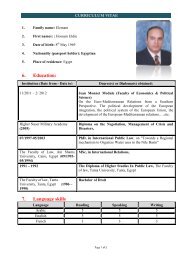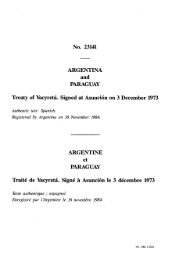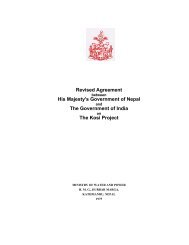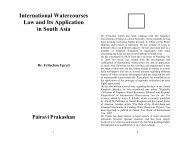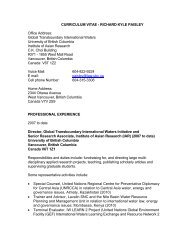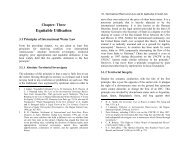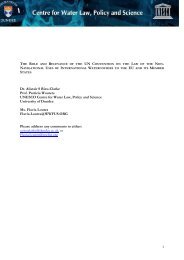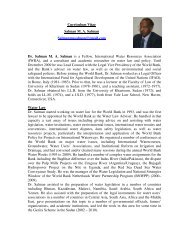Upreti, Trilochan, International Watercourses Law and Its Application ...
Upreti, Trilochan, International Watercourses Law and Its Application ...
Upreti, Trilochan, International Watercourses Law and Its Application ...
You also want an ePaper? Increase the reach of your titles
YUMPU automatically turns print PDFs into web optimized ePapers that Google loves.
Equitable Utilisation / 139 140 / <strong>International</strong> <strong>Watercourses</strong> <strong>Law</strong> <strong>and</strong> <strong>Its</strong> <strong>Application</strong> in South Asiaamounted to acquiescence, adding that when two countriesestablish a frontier between them, one of the primary objects isto achieve stability <strong>and</strong> finality. 105 Reasoning for that argumentis right in view of the fact that if once settled border issues beallowed to arise after a long period of time, the finality of theborder would remain forever unresolved. The principle ofacquiescence does not apply generally to IWL. Under the ruleof equitable utilisation envisaged in Article 6 of the UNCIW,even if one riparian state has been utilising a huge volume ofwater, it would be unfair to prevent another riparian state fromobjecting simply because of that state’s acquiescence, as suchuse is just one of the factors in the determination of equitableutilisation, <strong>and</strong> one which can be displaced by other factors. 106However, it is not the argument of the author that equity mayitself be a factor to be considered as part of equitableutilisation: equitable utilisation is a principle of equity.3.6.4 Ex Aequo Et Bono ( in Fairness <strong>and</strong> Right)Ex aequo et bono st<strong>and</strong>s outside the framework of law. If theuse of a set of legal rules is unable to deliver justice, or if thereare no such applicable rules to allow the dispensing of justice,ex aequo et bono provides both its own ends, means <strong>and</strong>justification for use. Under Article 38(2) of the ICJ's Statute,the ICJ is empowered, with the consent of parties appearingbefore it, to decide the case not by the application of law butrather by consideration of socio-economic, cultural <strong>and</strong>political factors. Until now, no case has been decided on such abasis by the ICJ or PCIJ, but the decision of an administrativetribunal of the <strong>International</strong> Labour Organisation based uponthe application of the principle of ex acquo et bono <strong>and</strong> notbased on any specific rule of law was upheld by the ICJ. Thetribunal decided a case by examining the appropriate level ofdamages, ex aequo et bono to fix what the court described as105 Ibid.106 Article 6, 36 ILM (1997) p. 704.measures of compensation. 107 The failure to use this clause38(2) demonstrates the reluctance of states to confer unbridleddiscretion on tribunals to avoid wholly arbitrary decisions. Inorder to invoke this Article specific consent from the party isrequired.Ex aequo et bono was also evaluated by the PCIJ in the FreeZone case (1929) between Switzerl<strong>and</strong> v. France, on the issueof free trading zone rights under the Treaty of Versailles 1919.France challenged such a right on the basis that a clauseabrogating those parts of the Treaty was agreed to bySwitzerl<strong>and</strong>. Under the arrangement, Swiss citizens were ableto do business in French territory surrounding Geneva withoutpayment of customs duties. The parties formed a specialagreement whereby the PCIJ would first determine the meaningof the clause, failing a private resolution of the dispute, <strong>and</strong>"settle" all outst<strong>and</strong>ing questions. The Court found that theclause did not abolish the regime in regard to the opportunity tosettle disputes if the disputants failed to settle the dispute bythemselves. The court rejected the French claim that a specialagreement empowered the court "to settle all questions". 108However, it seems that recourse to this branch of equity isignored by the community of nations.3.7 Equity for Scarce Resource AllocationIncreasing innovation in science <strong>and</strong> technology enables statesto harness resources from the deep ocean, the Continental Shelf<strong>and</strong> EEZ, which eventually gave birth to new internationalconflicts. There were no specific rules applicable in suchcomplicated circumstances, so equity embraced a newdimension to accommodate the interests of all concerned in acareful manner. Equity brings important advantages to this task,107 Supra note 69, p. 570; also see ICJ Reports 77, (1956), pp. 56-100.108 Free Zone Upper Savoy <strong>and</strong> the District of Gex, PCIJ Reports, (1930)pp. 10, 34, 40.



